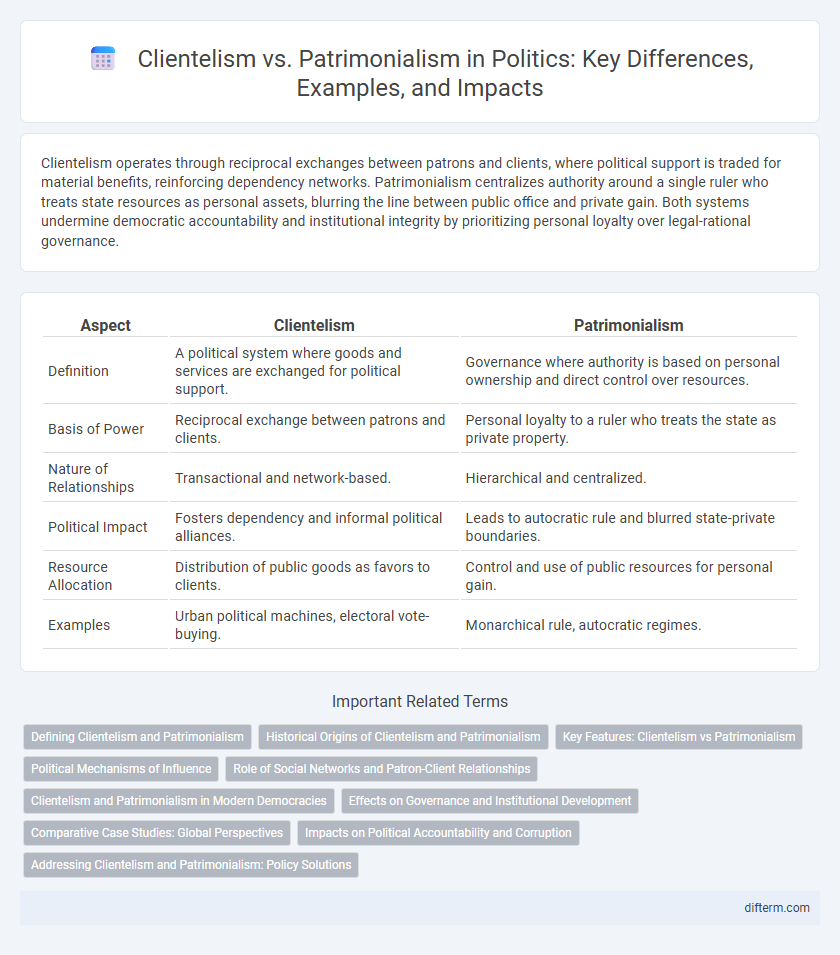Clientelism operates through reciprocal exchanges between patrons and clients, where political support is traded for material benefits, reinforcing dependency networks. Patrimonialism centralizes authority around a single ruler who treats state resources as personal assets, blurring the line between public office and private gain. Both systems undermine democratic accountability and institutional integrity by prioritizing personal loyalty over legal-rational governance.
Table of Comparison
| Aspect | Clientelism | Patrimonialism |
|---|---|---|
| Definition | A political system where goods and services are exchanged for political support. | Governance where authority is based on personal ownership and direct control over resources. |
| Basis of Power | Reciprocal exchange between patrons and clients. | Personal loyalty to a ruler who treats the state as private property. |
| Nature of Relationships | Transactional and network-based. | Hierarchical and centralized. |
| Political Impact | Fosters dependency and informal political alliances. | Leads to autocratic rule and blurred state-private boundaries. |
| Resource Allocation | Distribution of public goods as favors to clients. | Control and use of public resources for personal gain. |
| Examples | Urban political machines, electoral vote-buying. | Monarchical rule, autocratic regimes. |
Defining Clientelism and Patrimonialism
Clientelism refers to a political system where goods and services are exchanged for political support, often involving a reciprocal relationship between patrons and clients. Patrimonialism is characterized by a ruler treating the state as personal property, blending public authority with private interests and often relying on familial or close personal ties. Both concepts explain mechanisms of power distribution but differ in the structure and basis of loyalty within political regimes.
Historical Origins of Clientelism and Patrimonialism
Clientelism originated in ancient democratic practices, particularly in Classical Greece and Rome, where patron-client relationships structured political and social obligations; patrimonialism stems from traditional monarchies where rulers governed as personal property owners, integrating administrative authority with familial or tribal loyalty. Early clientelism emphasized reciprocal exchange and political support through favors, whereas patrimonialism relied on hierarchical, loyalty-based governance reinforced by kinship ties. These historical origins shaped distinct forms of political organization influencing modern state formation and governance patterns in many regions.
Key Features: Clientelism vs Patrimonialism
Clientelism is characterized by a reciprocal exchange where patrons provide goods or services in return for political support, relying heavily on personalized networks and voter loyalty. Patrimonialism features centralized power where leaders treat state resources as personal property, blurring the boundaries between public and private domains. Both systems undermine institutional governance but differ in the distribution of resources and the nature of authority exercised.
Political Mechanisms of Influence
Clientelism operates through reciprocal exchanges where politicians provide targeted goods or services to individuals or groups in return for electoral support, reinforcing personalized networks of loyalty. Patrimonialism centers on the distribution of state resources by a ruler or political elite to maintain control over administrative structures and ensure allegiance through hierarchical authority. Both mechanisms leverage personal relationships, but clientelism emphasizes vote-buying within democratic processes, whereas patrimonialism relies on centralized power and governance based on loyalty and patronage.
Role of Social Networks and Patron-Client Relationships
Social networks play a crucial role in clientelism by facilitating the exchange of goods and services for political support through personalized patron-client relationships. Patrimonialism relies more heavily on hierarchical authority and the direct control of resources by leaders, often limiting the influence of broader social networks. These dynamics shape how power is distributed and maintained in political systems, influencing governance and citizen engagement.
Clientelism and Patrimonialism in Modern Democracies
Clientelism in modern democracies manifests through personalized exchanges where political support is traded for material benefits, often undermining institutional integrity and fostering unequal access to resources. Patrimonialism involves the concentration of power within a ruling elite or family, blurring boundaries between public authority and private interests, leading to nepotism and weakened democratic accountability. Both phenomena challenge democratic principles by promoting informal networks over formal institutions, thus hindering transparency and citizen participation in governance.
Effects on Governance and Institutional Development
Clientelism undermines governance by fostering dependency networks that prioritize personal loyalty over merit, leading to inefficient allocation of resources and weakened institutional accountability. Patrimonialism blurs public and private spheres, resulting in governance structures where state resources are treated as personal assets, which stifles institutional development and perpetuates corruption. Both systems hinder the establishment of transparent, rule-based institutions necessary for sustainable political and economic growth.
Comparative Case Studies: Global Perspectives
Comparative case studies in global politics reveal that clientelism often sustains electoral support through personalized exchanges, while patrimonialism consolidates authority by blending public and private resources in governance, particularly in post-colonial states. For instance, Latin American democracies exhibit clientelist networks linking politicians to voters via targeted goods distribution, whereas patrimonial regimes in parts of Sub-Saharan Africa maintain control by treating state institutions as extensions of familial power. Understanding these dynamics enhances insights into state capacity, democratization, and corruption patterns across diverse political systems.
Impacts on Political Accountability and Corruption
Clientelism undermines political accountability by fostering dependency relationships where voters exchange support for personal favors, weakening institutional checks and encouraging corruption through targeted resource allocation. Patrimonialism erodes governance by blurring state and private resources, enabling ruling elites to consolidate power through nepotism and patronage, exacerbating systemic corruption and reducing transparency. Both systems hinder democratic processes by promoting personalized power structures that prioritize loyalty over merit and rule of law.
Addressing Clientelism and Patrimonialism: Policy Solutions
Effective policy solutions to address clientelism and patrimonialism emphasize enhancing transparency through digital governance platforms and enforcing strict anti-corruption laws that target informal networks of power. Institutional reforms promoting merit-based public service appointments and independent oversight bodies can dismantle personalized political exchanges and reduce discretionary resource allocation. Strengthening civil society participation and fostering inclusive political processes create accountability mechanisms that challenge entrenched patronage systems and encourage equitable governance.
clientelism vs patrimonialism Infographic

 difterm.com
difterm.com